Circular agriculture

Modern agriculture is able to produce large quantities of food at low prices, but often at the expense of the environment and biodiversity. Circular agriculture tries to minimize the use of external resources by relying on natural processes, producing resources locally and by reusing waste streams.
The principles of circular agriculture also lend themselves to increasing food security in smallholder agriculture in developing countries.
However, circular agriculture still faces a number of societal challenges:
- current policy and legislation often restrict the reuse of waste streams;
- farms are often highly specialised whereas circular agriculture requires diversity of animal and plant production systems;
- and it is unclear whether circular agricultural systems can be developed in the current institutional setting.
By studying all these aspects in a holistic way Utrecht University’s researchers are contributing to a transition towards circular agriculture.
Our experts
- Efficient crops
- Climate-proof crops
- Resistant crops
- Crops and microbes
- Re-use of agricultural waste
- Azolla
- Epidemiology and infectious diseases
- Animal welfare
- Biodiversity conservation
- Change in biodiversity and ecosystems
- Innovation Sciences
- Social-ecological transition
- Governance of nature and biodiversity






